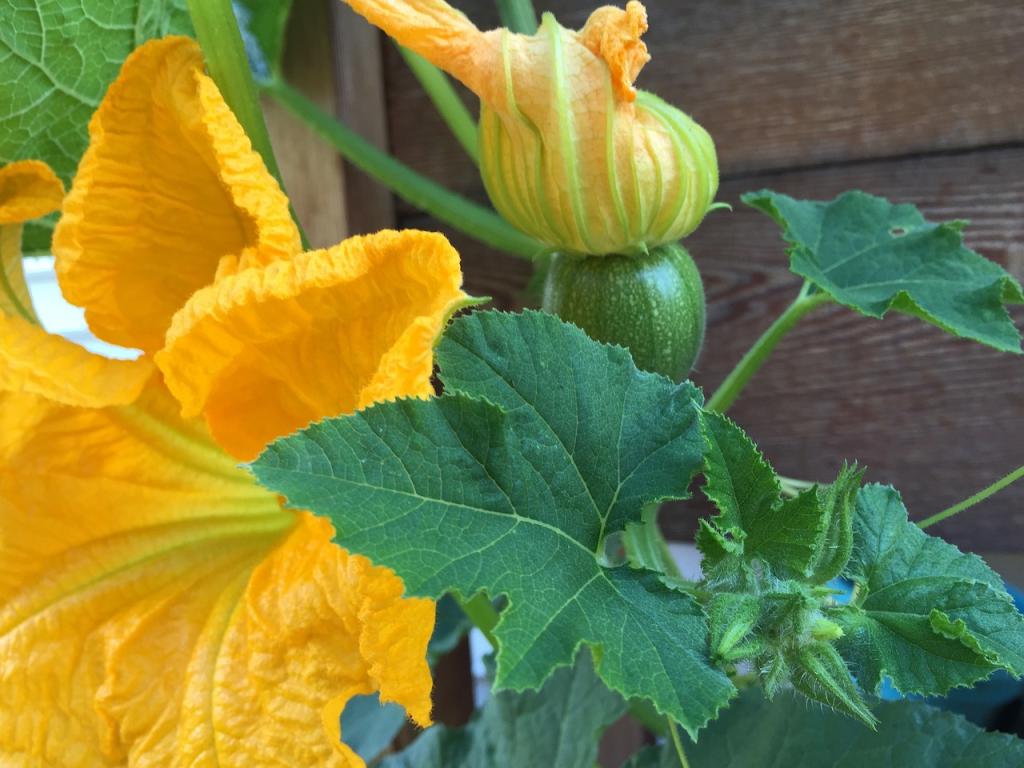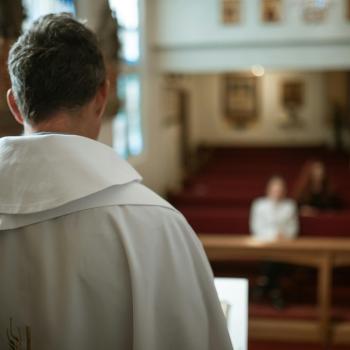Things are not always as they seem.
A month or so ago, a friend texted me: I have a really random question for you, she said. Go for it, I replied, wondering what really random, out-of-the-blue question she had for me.
She proceeded to ask if I was growing any pumpkins in my garden. Her godson, whom she was going to visit in late July, LOVED pumpkins more than anything else in the world. But grocery stores didn’t tend to stock pumpkins during the summer: if I happened to have a baby pumpkin growing on the vine, could she take it off my hands and make the day of a three-year-old boy in Seattle, Washington?

I walked out to the backyard and took a picture of a couple of baby pumpkins that had just started to fruit. Yes, indeed, I had baby pumpkins; I could help her out. Even though the fruit hadn’t yet turned color and was looking rather yellow, we promised to meet up, just before her trip, a wee little pumpkin my future promise to her.
A week or two later, I peeked under on
e of the leaves to check on the pumpkins, and noticed that the pumpkins were rather oblong in shape, their skin an even brighter shade of yellow.
That’s when it hit me: I was not actually growing pumpkins in my garden. I was growing (yet another) summer squash varietal in my garden.
I’d most likely mislabeled the seeds, remembering how I’d written “pumpkin, question mark” on a seed packet several months prior.
I would not be making her godson’s day, unless, of course, her godson held an affinity for All Things Gourd.
Things, after all, are not always as they seem – not in backyard gardens, nor in our ordinary, everyday lives.
I tell you this story, because when I sat with the gospel passage this last week, I was struck by the fact that things were not always as they seemed in the life of Jesus as well.
In Matthew 11, Jesus begins speaking to the crowd about John, the one who calls himself the beloved disciple. He’s invi
ting them to hear, to really lean in and listen to not only what he’s saying but also to the one who came before him – John – had to say as well.
It’s here that he makes a leap to a particular people, to “this generation,” calling them on their inability to see the truth that is directly in front of them.
It is like children, sitting in the marketplaces and calling to one another, ‘We played the flute for you, and you did not dance; we wailed, and you did not mourn.’ For John came neither eating nor drinking, and they say, ‘He has a demon’: the Son of Man came eating and drinking, and they say, ‘Look, a glutton and a drunkard, a friend of tax collectors and sinners!’ Yet wisdom is vindicated by her deeds.
Jesus spells it out, not only with examples from Scripture, but also of the one who came before him. Then, of course, he talks about the Son of Man, which is to say himself, speaking about himself in third-person form.

Now, lest you think we preachers always ride on a cloud of holiness, as soon as I saw this in the text, I immediately went down a vortex of “Jimmy” clips from Seinfeld: “You know, Jimmy is pretty sweet on you.” “Jimmy’s been watching you, you’re just Jimmy’s type.” “Jimmy’s new in town; Jimmy doesn’t really know anyone.” Third-person character Jimmy said these things about himself upon meeting Elaine for the first time, while third-person preacher-lady Cara wondered how epic 90s television might successfully make its way into a sermon.
Alas, just as Jesus finishes this declaration about himself, he says one final thing to the crowd: Yet wisdom is vindicated by her deeds.
Even if we don’t get it in the moment, wisdom is still vindicated by her deeds – the untrue things believed about the children who did not dance and mourners who did not cry, about John and about the Son of Man were cleared of blame and suspicion.
For things are not always as they seem.
Interestingly enough, it is in this very place in the text that Jesus pivots once again and begins to speak to his father. Although our particular reading skips five verses, omitting a scene of woe on towns that will not repent, a turning still happens.
Call it prayer or call it a conversation, it makes me wonder: was the crowd still gathered before him and Jesus just started talking to God in the moment? Did he bow his head, did he look up to heaven? Did he gaze into the eyes of the crowd as he spoke, or did he sneak off to the side and Matthew happened to be privy to it all?
We don’t know the answers to these questions, but we do know that Jesus begins to unpack things that sometimes feel hidden to us humans – things, one might say that haven’t yet been revealed and live in the land of not always being what they seem.
Then, he extends one final invitation:
Come to me, all you that are weary and are carrying heavy burdens, and I will give you rest. Take my yoke upon you, and learn from me; for I am gentle and humble in heart, and you will find rest for your souls. For my yoke is easy, and my burden is light.
Friends, when I read this passage, it was like the Spirit kindly reached down and smacked me upside the head.
I’ve long heard this passage and taken it to heart. Yes, when I am weary and tired (read: burnt out and exhausted), I can come to Jesus and he will be my rest. I can place those heavy things that weigh me down directly upon him, and in him, I will find rest.
I negated to understand the invitation in light of the whole passage.
Jesus says these words while he’s talking to God, while he’s in the middle of praying. I always imagined Jesus looking deeply into the eyes of the crowd and face by face, boring into their souls: I will be your rest, he said to each person.
But he wasn’t saying this to the individual, he was saying this to God about the individual.
This doesn’t change the truth of Jesus’ invitation, both to the crowd and to us, especially in light of the greater scene in which it takes place: an invitation to come exists when we’re not always getting it, when we don’t always understand, when things are not always as they seem.
Even in these places, when the obvious is right in front of us, but all the layers of understanding haven’t quite been peeled away, Jesus extends an invitation.
Come to me …when the diagnosis just doesn’t make sense. Come to me …when the death of your love makes you feel like the world’s never going to be made right again. Come to me …when the job search continues, when parenting feels impossible, when marriage is hard …and I will give you rest.
When put that way, or should I say, when third-person Cara puts it that way, the invitation just feels right.
Even when we mix up pumpkin and summer squash seeds and things are not always as they seem, it’s an invitation we can lean into.
It’s doable and real and maybe, perhaps, even applicable to our ordinary, everyday lives.
Come to me, Jesus says, and I will give you rest.
—
This is a sermon preached on July 9, 2023 at St. Paul’s Episcopal Church in San Rafael, California. How are things not always what they seem in your life?

















